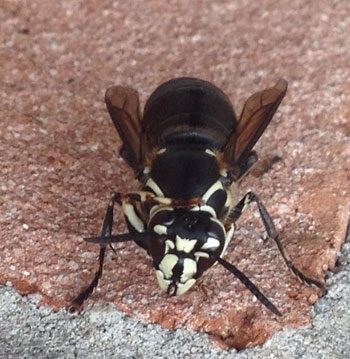Late Summer Bees and Wasps

It’s a beautiful August afternoon and you park yourself in your favourite deck chair with a cool summer drink and they find you. You try to throw out a coffee cup, but you can’t get near the garbage can because they are all over the trash bin. WASPS. As summer winds down, bees and wasps become very active around us, primarily due to a change in their diet.
Early in the season, bees and wasps are primarily interested in gathering protein for the young in their colonies. For bees, the protein is often in the form of pollen and for wasps, it’s usually from consuming other insects. We are all well aware of the beneficial aspects of bees, but wasps also play a role with their hunting skills. As the days shorten, their food preference switches to a high carb diet.
Bees survive the winter in their nests, but must stockpile enough carbohydrates to keep the colony going through to the spring. With wasps, only the queen will survive the winter and the rest of the colony will die off at the first hard frost. The workers in the wasp colony go into “pig out mode” when the queen stops laying eggs, and are after those carbs for their own enjoyment until summer ends. So anywhere outside that you can find sweet carbs, you will find wasps gorging themselves.
Another reason for the seemingly huge numbers of late summer wasps is simply that they’ve been rearing young all summer. By August or September, they’ve had several months to build up their numbers and the colony may have thousands of workers now released to spend their remaining days looking for food for themselves. The trouble with these large numbers of wasps hanging around the same areas people like to be in the summer is the potential to get stung. For some, it’s a painful reminder that these creatures deserve a little respect. For others, potentially serious consequences can arise from an allergic reaction to a sting. While bees and wasps do not go out looking to sting people, like any other creature, they will aggressively defend themselves and their nests.
At Protec Pest Control, we work with a local beekeeper whenever possible to try to relocate honey bees. Because of their vital role in our environment and their importance to our food supply, we would prefer not to harm bees whenever possible. We always use the safest control methods available and all our technicians have many years experience handling wasp and bee problems. Call Protec Pest Control today.
See our pest library for more information on wasps and bees or contact us to speak with a technician about your wasp/bee issues.
